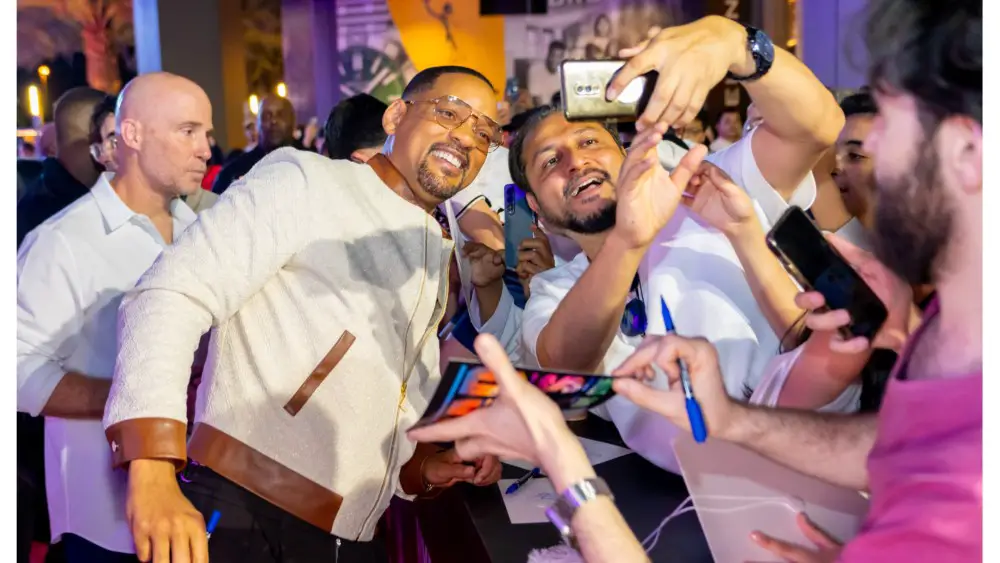Superstar Will Smith looks back on his 30 years at the top of the global box office and honed his winning formula. When you want to conquer international markets, staying silent is often the key.
“As soon as people have to read subtitles or have to translate, you lose a little bit of the connection,” Smith says. “In general, if you can find a way other than dialogue; [to transmit an emotional beat]which translates more globally. When it comes to action, comedy, and conveying emotion, I’m always looking for non-interactive ways to convey the most important parts. ”
Smith shared his insights at this year’s Saudi Film Confex, a Riyadh-based trade conference where the Oscar-winning star was a guest of honor. And beyond the fact that Smith’s Bad Boys: Ride or Die recently became Saudi Arabia’s highest-grossing film in history, Smith’s presence in Riyadh has brought broader patronage.
After decades of stagnation in the Saudi film industry, the local production, distribution and exhibition sectors have all experienced rapid growth, more than making up for lost time. This growth, and with it the evergreen privilege that greater possibilities lead to greater responsibilities, underlined and informed all the talks at Confex, which took place from October 9th to 12th.

saudi film confex
The second edition of Confex will feature over 30 panel discussions, 15 workshops and exhibitions spanning over 16 sectors of the film value chain, all providing a snapshot of an emerging industry defining its identity and ambitions in real time. provided. Many panelists pointed to opportunities to leverage AI workflows and popular animation, with many successful manga adaptations pointing to Saudi-Japanese partnerships as a promising path forward.
And almost all were focused on mass appeal.
In recent months, domestic hits such as “Mandub” have parlayed local success into international releases in France and the United Kingdom, and “Hajjan” from director Abu Bakr Shawki (“Yomedin”), which received acclaim at Cannes, has parlayed local success into international releases in France and the United Kingdom. premiered in Toronto, just as adventure films such as “Dream” hit Saudi screens after their global run. (Another recent success is “Shabab Albom,” an action satire based on the decade-old cult TV series “Firecracker Youth.”)
This impressive record contributes to the prosperity of the domestic industry, with this year’s Saudi Film Confex recording record attendance, with 65,000 attendees expected and a further 5,000 happily welcomed, resulting in 25 A contract worth $60 million was signed. This local growth only fuels the desire for international expansion. Back to a guest of honor who was insightful about that particular concern.
In fact, compared to many of his colleagues, Smith has always been surprisingly candid about the intrigues and strategies of his global operations, often likening his position to that of a diplomat or ambassador.
“As a movie star, [you’re] It’s about nurturing certain global relationships,” he explains. “You’re taking your audience into account and really delivering on your relationship.” [and doing so] You can see your business more holistically. ”
“There’s a local aesthetic and a global aesthetic,” Smith says, citing the rise of Korean cinema as a more modern example of the latter and pointing to his own childhood admiration for Bruce Lee as an earlier iteration of it. did.
“When I was 10 years old, the only thing I knew about China was Bruce Lee,” he says. “Bruce Lee introduced me to Chinese culture, and I wanted to be like that.” [him]. So I would say, who would be willing to do that? [do the same]?Who will be the ones to step up and share their culture with the world?”

saudi film confex
Of course, as the actor revealed, a charismatic idol alone is not enough to carve an international path. Instead, local filmmakers will have to emphasize universal themes and universal formats, striking a precise and often difficult balance between authenticity, accessibility, language, and more.
This particular line resonated in many of the Confex panels, especially those highlighting the film’s power over soft diplomacy. Far from competing with Hollywood, a significant number of Saudi filmmakers would rather provide a corrective to the overwhelmingly negative light that is too often cast on the Arab world. .
Prince Turki Al Faisal Al Saud, a former head of Saudi intelligence and a former ambassador to both the UK and US, spoke on a Confex panel attended by the country’s first culture minister and current incumbent prince. In our discussion, we praised film’s potential for just that kind of positive cultural diplomacy. Badr bin Abdullah bin Farhan Al Saud.
“Seeing is believing,” the crown prince echoed similar advice from the once-fresh-faced crown prince, before evoking Agustí Villalonga’s biopic of the young King Faisal, Born a King. he said.
Released in 2019 and a regional box office success, the Spanish-British co-production remained the first major international feature to be shot in the Kingdom, relying on local cast and crew until 2017. Ta. Less than a decade later, the domestic industry now has the incentives and infrastructure to develop, finance, produce and distribute such titles in-house, and with that, the desire to take commercial works to the world. There is also a desire to do so.
“You’re in an unprecedented phase,” Smith said encouragingly. “This is a unique and rare opportunity where the world is waiting to see what you do and hear what you have to say. I want to say, take it seriously. You have the resources and the support. We have a history, and now is the time to make a difference.”

saudi film confex
